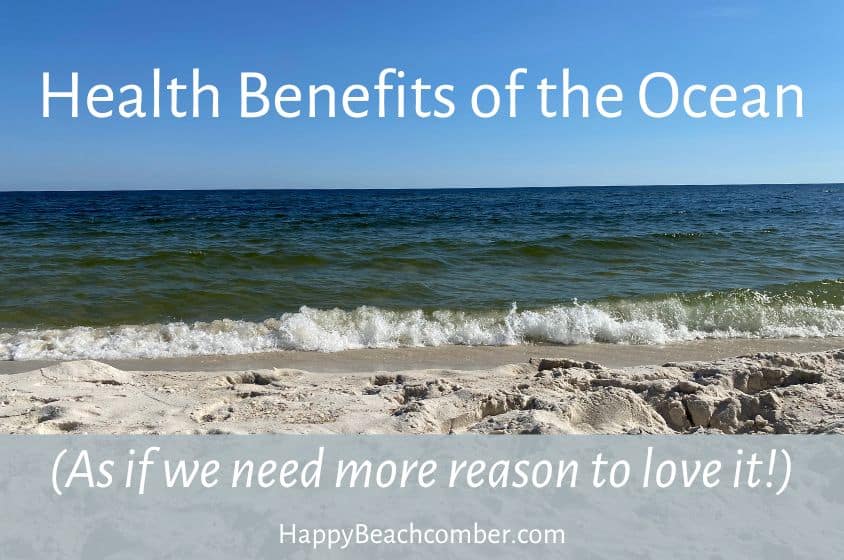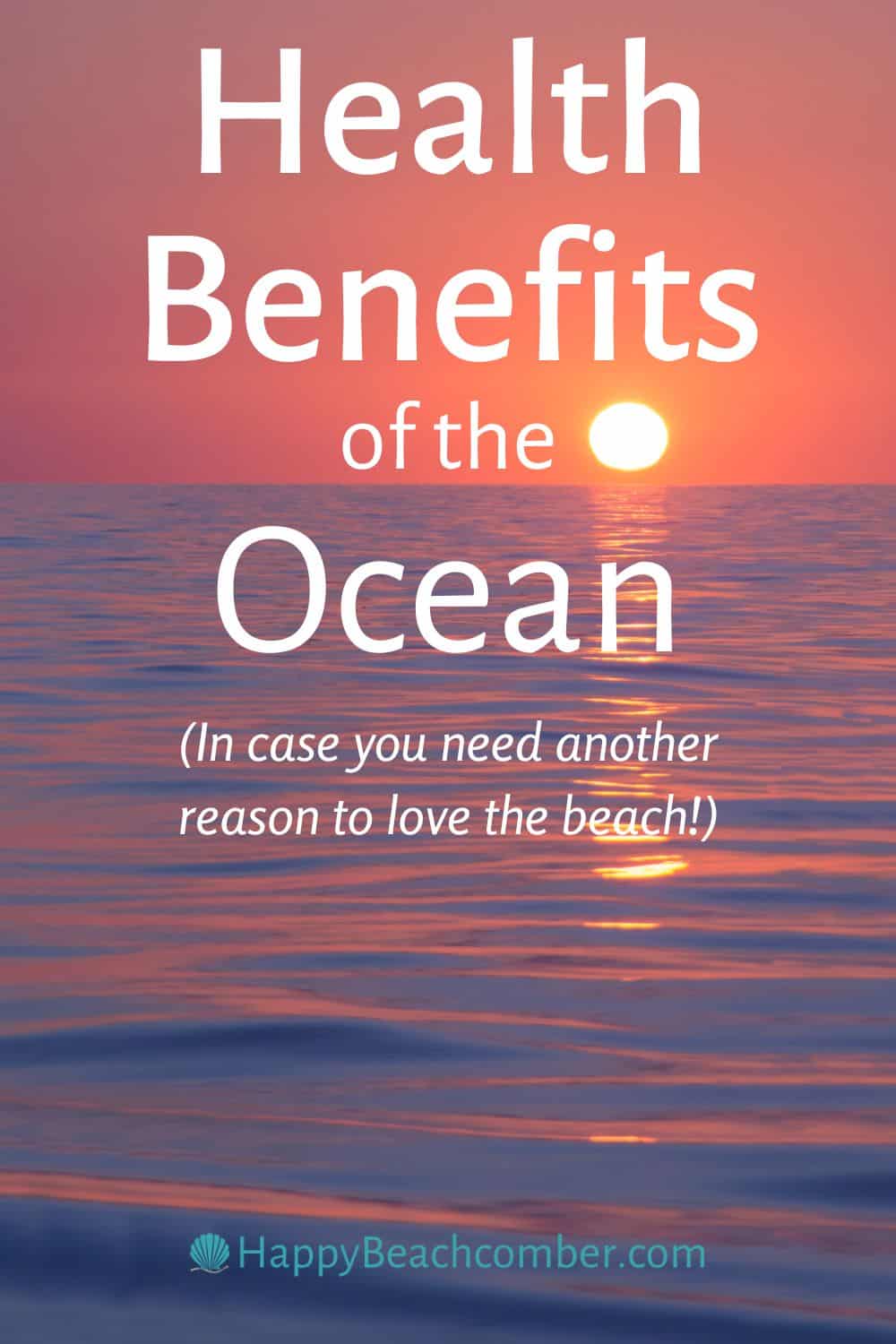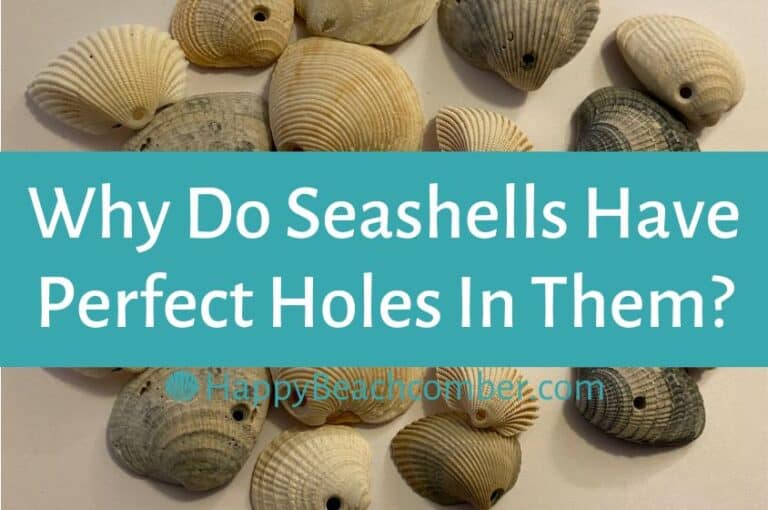Health Benefits of the Ocean [As if we need more reason to love it!]
We love going to the beach because it’s fun, invigorating, relaxing, and soothing to the soul. Is that “all in our heads”? No! Studies tell us there are a wide range of health benefits of the ocean (and some of them may surprise you).

What We Love About the Ocean
It’s downright fun. Kids love it. Adults of every age love it. Some adults dive into a beach trip with all the enthusiasm and energy of youngsters. Others draw pleasure from simply sitting and observing.
It’s the beauty of the environment – the majesty and mystery of the ocean, the sound of its rolling waves, its unique plant and animal life. We delight in all the sights, sounds, and smells, and in the feel of the warm sun and gentle breeze.
We love the ocean because it makes us feel better in body, mind, and spirit. That isn’t all in your head, and it isn’t something you just tell yourself to justify taking a seashore vacation. There are real, valid health benefits of being in or near the ocean.

How Our Bodies Can Benefit From the Ocean
Simply being at the seashore can be energizing. Most of us tend to be more physically active. We wade in the breakers looking for shells, stroll on the beach, play sports and beach games or even swim.
My favorite beach activity is walking. At home I walk 4 miles a day almost every day. At the beach my distance increases to 9 or 10 miles a day because I love it. At home walking is exercise and reasonably pleasant. At the beach it is pure joy.

Some of the physical health benefits of going to the beach include:
- Beach walking works more muscles, especially walking in soft, deep sand.
- Walking on sand exfoliates your feet.
- Swimming in the ocean gives you full-body workout that may be beneficial with your circulation and immune system. (much more on swimming below)
- Seawater contains minerals that, in some cases, may produce antibacterial effects that promote healing.
- The magnesium in seawater supports cell function and repair and helps activate vitamin D. This can be beneficial in hydrating your skin and improving its elasticity and appearance.
- Being at the ocean means being in the sunshine. Obviously you want to avoid over exposure, but a little sun every day is good for you. It’s your natural source of vitamin D, and the sun can actually help heal conditions such as psoriasis.
Mental Health Benefits of the Ocean
Any vacation can (and should!) give us a mental break from the strains and stresses of every day life. A trip to the seashore is no exception. Sitting on the sand or strolling along the water’s edge is a wonderful opportunity for mindfulness. For me, the beach is the best place on earth to simply “be”.
In fact, studies have shown that people who live in close proximity to the coast report significantly better mental and general health than those who don’t. The individual effects may be relatively small yet have an important impact on the community.
So, what is it about the ocean that makes you feel so happy, rested, and content?

A few of the many positive influences of the ocean include:
- The blue color of ocean water makes us feel calm and peaceful. For some, blue may even encourage creativity.
- The sound of waves is relaxing, and if you feel lulled by the rhythmic ebb and flow that isn’t your imagination. Scientists say that consistent sound works to de-stimulate your brain, which helps us slow down and relax. We can momentarily escape from the usual mental chaos and just enjoy being in the moment.
- The fresh smell of the ocean air is also soothing, possibly because you’re breathing in negative ions. (You can experience this same soothing effect near a waterfall.)
- The feel of warm sand beneath your feet is another sensation that contributes to your feeling of being relaxed.
For me, there is also something very soothing about the feel of the warm sun on my skin (and yes, I always use loads of sunscreen).
Dr. Richard Shuster, a marine biologist, says that simply gazing at the ocean can change the frequency of our brain waves and result in a mild, meditative state. (See his book below.)
Also worth noting is that part of this actually is all in your head. Books, movies, TV shows, and even commercials are famous for portraying the beach as a place of peace and tranquility. Over the years we’ve been conditioned to expect the beach to be peaceful and relaxing.
For me the same is true any time I’m around water. Just look at these Amazing Pools Around the World. How could you lounge beside one of those and still feel stressed out?!
But of course, unless the pool is next to the ocean, you don’t benefit from the whole, wonderful ambience the seashore has to offer.
What the Ocean Doesn’t Do For You
Be careful what you read on the web. I found numerous non-scientific sites with misinformation. These include travel blogs, resort sites, surfing blogs and other special interest sites related to the seashore.
Several of those sites list claims of using seawater to treat or cure a wide range of diseases and conditions: cardiovascular problems, high cholesterol, high blood pressure, obesity, diabetes, fatigue, stomach ulcers, and lots more. This information is half true.
Studies have indeed been done on using ocean water for treatments and cures, but it’s not about simply playing or swimming in the ocean. It involves the use of Deep Sea Water (seawater pumped from a depth of over 200 meters) that has been through a specific desalinization and distillation process. You can read all the details in this National Library of Medicine article.

Health Benefits of Swimming in the Ocean
Swimming in any water is one of the best ways we can exercise. It can help you increase your strength and endurance, relieve stress, and improve your mood. For anyone with joint issues, swimming is also a great low-impact workout.
Ocean swimming is not the same as pool swimming because it creates a different set of challenges, some good and some not so good. Let’s consider the good news first.
The Benefits of Swimming in the Ocean
The most obvious benefit is relaxation. Being near most any body of water can be soothing to the soul, and for beach lovers the ocean is the best. In addition to invigorating exercise, you get to enjoy the whole delightful atmosphere of the seashore.
Other benefits include:
- Shifting currents, tides, and waves create varying water resistance that you must constantly react and adjust to. That extra work helps you build a strong core.
- Water resistance in the ocean also helps increase your strength and endurance because you have to work so much harder than in a pool or the still waters of a lake.
- The high mineral content of sea water makes it helpful for skin conditions such as eczema and psoriasis.
- Iodine and sodium levels in ocean water may be useful in helping wounds to heal. (However, note that ocean swimming with an open wound risks exposure to potential bacterial infections.)
It’s also possible that swimming in the ocean could help relieve hay fever and sinusitis and promote a healthier respiratory system. It is thought to have something to do with saline reducing inflammation, but there is no hard scientific evidence on that.
Finally, your mental health can benefit from exercising in any natural setting. That’s because you’re combining both the usual benefits of exercise with the restorative effects of enjoying the natural environment. For beach lovers, ocean swimming can work wonders for getting in shape and relieving stress.
By the way, did you know that there is actually a name for the use of ocean water for medical purposes? It’s called “thalassotherapy”.

The Downside of Swimming in the Ocean
On the other hand, there are definitely some drawbacks to consider, but don’t be discouraged. For the most part you just need to be prepared, pay attention, and use common sense. Potential hazards include:
- Extremely cold water has the potential to cause hypothermia.
- Strong currents and riptides can be deadly even for the best swimmers.
- Jellyfish, sharks, and other marine life can pose threats to physical safety.
- Ironically, one of the benefits can also be a potential hazard. That is, shifting currents, waves, and tides may affect water resistance or produce other sudden, unpredictable changes.
Clearly, ocean swimming is not for the amateur. If you aren’t already in good physical shape and accustomed to regular exercise, the ocean is not your best place to start.
No one should swim in the ocean alone, including the fittest of athletes. Check weather and water conditions before you begin, and you may want to consider wearing a wet suit. Even Emerald Coast waters can get quite cold in winter months.
Be aware of all the pros and cons before you venture out. For some excellent tips on safe and successful ocean swimming see this article at Livestrong.
Ocean-Based Pharmaceuticals
One last point of interest involves the health benefits from the ocean. That includes both natural supplements and pharmaceuticals, especially cancer-fighting drugs.
Numerous different approaches are used in the discovery and development of pharmaceutical drugs, but nature has always been the traditional source. According to the National Library of Medicine, “without a natural product to lead science to its biological target, many drugs would never have been developed”.
Nowhere is that opportunity greater than in the ocean. Much of the deep blue sea remains a mystery, but one thing we do know is that its incredibly diverse marine life offers untold possibilities for health benefits – from improving quality of life to actually saving lives.
Drugs for Cancer Treatment
Scientists have already discovered a wide range of drugs derived from the compounds produced by marine plants and animals. A few of the cancer-fighting pharmaceuticals include:
- Cytarabine – used in the treatment of various forms of leukemia and Hodgkin’s lymphoma
- Trabectedin – a chemotherapy drug used to treat advanced soft tissue sarcoma and for relapsed ovarian cancer
- Eribulin Mesylate – used for treatment of advanced metastatic breast cancer and inoperable advanced soft tissue sarcoma
- Brentuximab Vedotin – used for treatment of certain advanced or high-risk patient cases of Hodgkins lymphoma
- Midostaurin – used along with chemotherapy drugs for treatment of certain types of AML, and also certain types of mastocytosis
Other Pharmaceuticals From the Sea
In addition to cancer drugs, many other marine-based pharmaceuticals have been developed or are in the process. Ara-A is already available for the treatment of herpes infections. As well, findings show possible potential for antivirals and antifungals. Some anti-inflammatory drugs and analgesics have reached clinical trial stages.
Note that there are also quite a number of ocean-based natural products on the market. These are more difficult to research in the U.S. because what we usually call “supplements” are not regulated. To learn more about those you might try a good health food store with a knowledgable staff.
Now…next time you start planning a beach trip remember that besides being fun, it can be good for your health too!
You may also like… For a very interesting read check out “Blue Mind” by marine biologist Dr. Wallace J. Nichols. He describes this book as being where physiology, psychology, and the ocean meet. The title says it all:
Blue Mind: The Surprising Science That Shows How Being Near, In, On, or Under Water Can Make You Happier, Healthier, More Connected, and Better at What You Do
Click to see it on Amazon
If you enjoyed this info please share on Pinterest and help spread the word!









